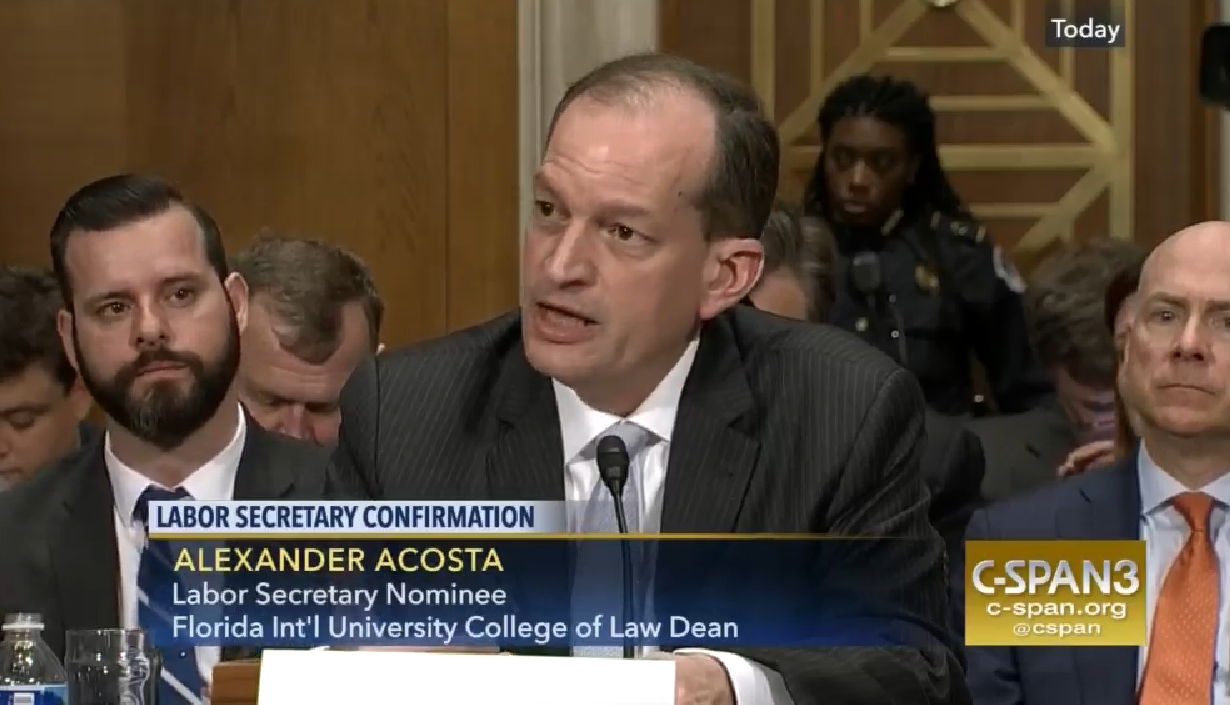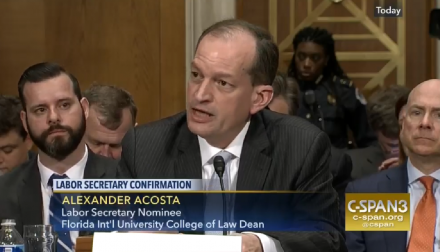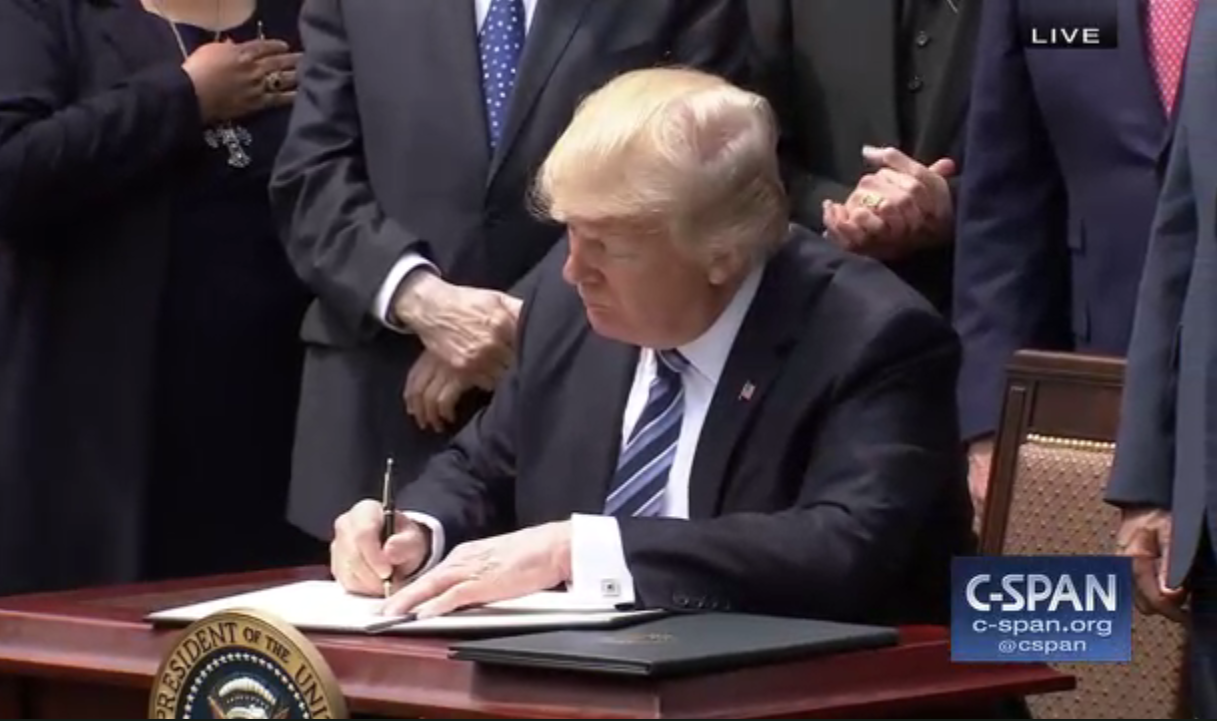Abortion rights, women of color, and LGBTQI+ people are under attack. Pledge to join us in fighting for gender justice.
Acosta’s Testimony Fails to Clarify Views on Labor Policies Crucial to Women

 Two months after President Trump’s inauguration, the Senate finally held a hearing for his second nominee for Secretary of Labor, R. Alexander Acosta. (Trump’s first nominee, fast-food CEO Andrew Puzder, withdrew from consideration the day before his hearing and has since resigned from his job.) But for anyone concerned about the rights and well-being of working people, yesterday’s hearing made for a frustrating morning.
Two months after President Trump’s inauguration, the Senate finally held a hearing for his second nominee for Secretary of Labor, R. Alexander Acosta. (Trump’s first nominee, fast-food CEO Andrew Puzder, withdrew from consideration the day before his hearing and has since resigned from his job.) But for anyone concerned about the rights and well-being of working people, yesterday’s hearing made for a frustrating morning.
Women make up half the workforce and nearly two-thirds of workers in low-wage jobs. They need a Labor Secretary committed to supporting and enforcing workplace policies vital to women’s equality, safety and economic security, including increases in the minimum wage, strong overtime protections, protection from discrimination and sexual harassment, paid family and medical leave, and paid sick days. Several aspects of Acosta’s record raised concerns about his nomination to lead an agency dedicated to protecting working people, and his commitment to enforcing these critical labor, employment and civil rights protections and policies free from improper political influence.
The hearing was an important opportunity for the members of the Senate Health, Education, Labor and Pensions (HELP) Committee to thoroughly examine Acosta’s record and publicly establish his stance on many of these vital issues, including the implications of increasing the federal minimum wage, ensuring tipped workers are entitled to the same cash minimum wage as other workers, and expanding eligibility for overtime pay for closing the gender wage gap, and the role that access to paid family, medical and sick leave plays in helping women maintain employment while ensuring their own health and fulfilling caregiving responsibilities. The hearing was also the first time that Acosta would be asked about his commitment to vigorous enforcement of the labor and employment protections that the Department of Labor oversees, and his strategy for ensuring that personnel and enforcement decisions at the Department of Labor would be free from the political interference that characterized his leadership at the Department of Justice’s Civil Rights Division.
Unfortunately, yesterday’s hearing failed to provide clarity on a number of these issues. Despite nearly three hours of testimony, Acosta provided few details about his views on, or plans for, implementation and enforcement of labor and employment protections, and was evasive or vague when questioned directly, even while declaring that he would be an advocate for workers. For instance:
- President Trump has proposed slashing the Department of Labor’s budget by $2.5 billion, or 21 percent, which would impose drastic changes on the Department’s operations, including the ability to enforce critical labor and employment laws, or to expand employment opportunities, such as through job training programs. Acosta was asked several times if he would commit to maintaining at least level funding for vital programs and agencies, and each time he demurred, observing that difficult decisions would have to be made, and that the budget was ultimately determined by Congress.
- Acosta acknowledged that the gender wage gap exists, and indicated that he would look to the Women’s Bureau to address pay and gender discrimination. But when Senator Murray asked him if he would maintain funding for the Women’s Bureau, Acosta refused to make such a commitment.
- Several senators asked Acosta directly if he would commit to enforcing existing workplace regulations, including the Obama Administration regulation expanding access to overtime pay for millions of workers. Although Acosta expressed regret that the overtime rule had not been updated in over ten years, he refused to commit to continuing the Department’s defense of the rule in pending litigation—and even suggested that it was an open question whether the Department of Labor had the authority to set a salary threshold for determining overtime eligibility at all.
- Although Acosta described the importance of worker safety on a few occasions, when pressed by Senator Warren, he refused to commit to enforcing an existing regulation to protect workers from exposure to cancer-causing silica dust – instead deferring to President Trump’s recent executive order requiring all federal agencies to review such regulations with an eye to revision or repeal.
- He defended his 2004 decision, while at the Civil Rights Division, to send an unsolicited letter brief defending voter suppression efforts to a judge hearing a voting rights case.
The HELP Committee will vote on Acosta’s nomination on March 30; we urge them to use the intervening time to obtain more detailed responses to written questions and closely scrutinize his record. The economic security of America’s working people and their families is at stake.





